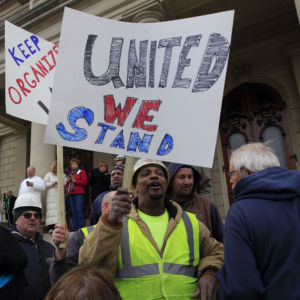Conservatives are generally supportive of right-to-work laws, but some are expressing concerns over whether it should be a national policy.
Congressional Republicans introduced a measure Feb. 1 with the aim of making right-to-work a national law. Conservative Political Action Conference (CPAC) attendees stated support for the policy as a whole. Nevertheless, some questioned whether it should be decided by the federal government.
“It sounds to me like something like that ought to be a states level issue,” CPAC attendee Fran Finnegan told InsideSources. “Let the states compete with each other based on stuff like that. That would be my opinion.”
Finnegan adds that hopefully states will adopt the policy once they see it’s successful. Federal law currently allows states to decide on their own whether they want to be right-to-work or not. The national right-to-work bill would end that choice by making the policy national law.
“I’m conflicted between two different impulses–which is the idea is right in principal; on the other hand, I’m not thrilled with forcing uniform national legislation,” CPAC attendee Jonathan Rodney told InsideSources. “How to resolve that conflict, I’m not entirely sure.”
The bill is likely to face fierce opposition as it works its way through the legislature. Nevertheless, Republicans hold a congressional majority, making its passage a possibility. President Donald Trump has already stated his support for right-to-work laws and is likely to sign such a bill.
“I have a hard time with someone forcefully taking money out of my paycheck, and then using that money to lobby for things that I don’t believe in,” CPAC attendee Ghenna Rankin told InsideSources. “I believe it definitely needs to be left to the states.”
Rankin adds national policymakers could advocate for states to adopt it. But she believes it ultimately should be left to the people to decide locally. The passage of the 1947 Taft-Hartley Act first allowed states to decide whether they want to be right-to-work or not.
“I’m a big supporter of right-to-work,” Gays For Trump co-founder Scott Presler told InsideSources. “The one thing I’m not sure about is, should it come from the federal government or should this be a states rights issue because I do consider myself a federalist, therefore, having things come down from the federal government worries me.”
Some conference attendees weren’t as opposed to the policy becoming national law. Pam Roehl notes the country seems to be going that direction anyway with most states adopting the law already. She also believes people shouldn’t be forced into a union.
“There are situations where people are forced to have a union,” Roehl told InsideSources.”It seems to be the direction the nation is going. I’m from Chicago, and the unions–what was a good idea at one point with meat packing plants, has now become a negative.”
Unions and other critics of the law argue it will make it more difficult for workers to collectively bargain for better wages and working conditions. Those in support of the policy contest it merely gives workers a choice. They also believe it helps to attract business.
Americans generally support the policy, despite its very adamant opponents. Gallup found in a 2014 poll the policy has 71 percent support.

